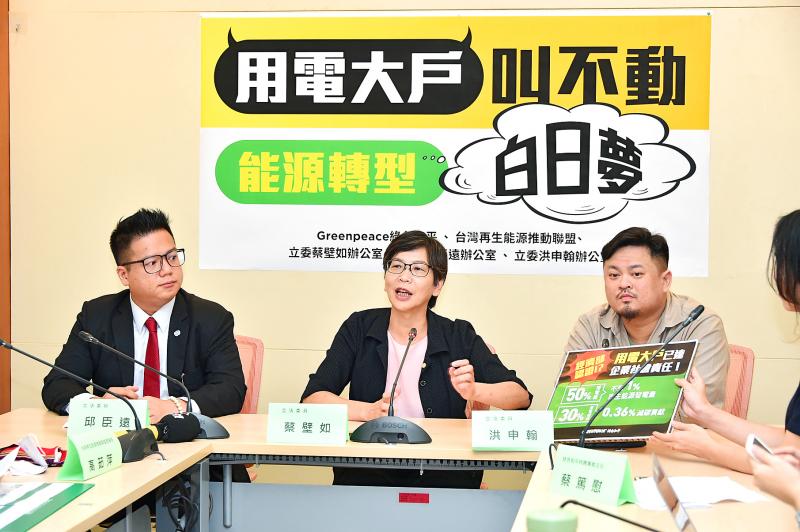Lawmakers and environmentalists yesterday called on the government to tighten rules on minimum green power requirements for large corporations that use a lot of electricity.
The Ministry of Economic Affairs on Aug. 26 announced draft regulations governing electricity consumption, with firms required to install renewable energy facilities if they exceed the limits.
Taiwan Renewable Energy Alliance director Kao Ju-ping (高如萍) said that the proposed rules would waive government agencies’ responsibility to lead by example by installing sources of renewable energy.

Photo: Tu Chien-jung, Taipei Times
Kao disagreed with the Bureau of Energy, which said that Article 12 of the Renewable Energy Development Act (再生能源發展條例) covered government agencies, so they did not need to be covered by the proposed regulations.
Article 12 stipulates that if green energy facilities are feasible, government agencies should prioritize them when constructing new buildings, expanding or renovating existing facilities and public buildings, and engaging in public construction projects.
“The article pales in comparison to the draft act,” Kao said.
Greenpeace Taiwan energy project campaign specialist Alynne Tsai (蔡篤慰) said that the bill should aim to reduce carbon emissions — using 2010 as a baseline — by 45 percent by 2030.
It is ludicrous that the ministry labels firms that use half of the nation’s power supply and produce 30 percent of the nation’s carbon emissions as “socially responsible” when, according to the bill, they would only have to generate less than 1 percent of the renewable energy on the national power grid, which equates to a 0.36 percent reduction in carbon emissions, Tsai said.
Heavy power consumers should aim to have 20 percent of their power consumption from renewable sources, Tsai said.
Taiwan People’s Party Legislator Tsai Pi-ru (蔡璧如) said that the draft act narrows eligible corporations from 5,400 to 506, as it identifies heavy power consumers as entities that have at least 5,000 kilowatts (kW) of capacity.
However, the Energy Administration Act (能源管理法), as well as local ordinances in Tainan, Taichung and other places, recognize heavy power consumpers as those that have at least 800kW, Tsai Pi-ru said.
The Executive Yuan lacks the resolve to promote green energy, she said, adding that even 10 percent would be too low a requirement for their renewable energy production.
“The government must stand its ground and call these corporations to account,” Tsai Pi-ru said.
Democratic Progressive Party Legislator Hung Sun-han (洪申翰) said that there was room for improvement, such as gradually expanding the list of corporations that are subject to the regulations and cutting the buffer time from five years to three years.
The first wave of heavy power consumers should install renewable energy sources by 2023, Hung said, adding that the ministry should mull how to encourage them to meet their obligations.
It should also consider a more flexible method to purchase green power generated by them, he said.

Chinese Nationalist Party (KMT) Chairman Eric Chu (朱立倫), spokeswoman Yang Chih-yu (楊智伃) and Legislator Hsieh Lung-chieh (謝龍介) would be summoned by police for questioning for leading an illegal assembly on Thursday evening last week, Minister of the Interior Liu Shyh-fang (劉世芳) said today. The three KMT officials led an assembly outside the Taipei City Prosecutors’ Office, a restricted area where public assembly is not allowed, protesting the questioning of several KMT staff and searches of KMT headquarters and offices in a recall petition forgery case. Chu, Yang and Hsieh are all suspected of contravening the Assembly and Parade Act (集會遊行法) by holding

PRAISE: Japanese visitor Takashi Kubota said the Taiwanese temple architecture images showcased in the AI Art Gallery were the most impressive displays he saw Taiwan does not have an official pavilion at the World Expo in Osaka, Japan, because of its diplomatic predicament, but the government-backed Tech World pavilion is drawing interest with its unique recreations of works by Taiwanese artists. The pavilion features an artificial intelligence (AI)-based art gallery showcasing works of famous Taiwanese artists from the Japanese colonial period using innovative technologies. Among its main simulated displays are Eastern gouache paintings by Chen Chin (陳進), Lin Yu-shan (林玉山) and Kuo Hsueh-hu (郭雪湖), who were the three young Taiwanese painters selected for the East Asian Painting exhibition in 1927. Gouache is a water-based

Taiwan would welcome the return of Honduras as a diplomatic ally if its next president decides to make such a move, Minister of Foreign Affairs Lin Chia-lung (林佳龍) said yesterday. “Of course, we would welcome Honduras if they want to restore diplomatic ties with Taiwan after their elections,” Lin said at a meeting of the legislature’s Foreign Affairs and National Defense Committee, when asked to comment on statements made by two of the three Honduran presidential candidates during the presidential campaign in the Central American country. Taiwan is paying close attention to the region as a whole in the wake of a

OFF-TARGET: More than 30,000 participants were expected to take part in the Games next month, but only 6,550 foreign and 19,400 Taiwanese athletes have registered Taipei city councilors yesterday blasted the organizers of next month’s World Masters Games over sudden timetable and venue changes, which they said have caused thousands of participants to back out of the international sporting event, among other organizational issues. They also cited visa delays and political interference by China as reasons many foreign athletes are requesting refunds for the event, to be held from May 17 to 30. Jointly organized by the Taipei and New Taipei City governments, the games have been rocked by numerous controversies since preparations began in 2020. Taipei City Councilor Lin Yen-feng (林延鳳) said yesterday that new measures by